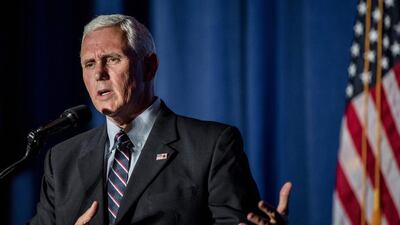It would be fair to say the post of vice president of the United States is not exactly seen as the pinnacle of a distinguished political career.
Franklin D Roosevelt worked his way through three of them. His predecessor, John Nance Garner described the job in a phrase that has been Bowdlerised to “not being worth a bucket of warm spit”. Dwight Eisenhower is said to have had little time for his vice president, Richard Nixon, once saying that it would take him a week to think of a contribution he made to his administration.
Nixon’s vice president, Spiro Agnew, was forced to resign early in his second term after being charged with bribery, conspiracy and tax fraud.
The role of the vice presidential candidate is to “balance the ticket”. Lyndon Johnson was supposed to deliver the South to John F Kennedy; Joe Biden’s unique selling point was his working-class credibility, intended to offset the more aloof Barack Obama.
Since the Second World War, two vice presidents became president without being directly elected: Johnson following Kennedy’s assassination and Gerald Ford after Nixon was forced to resign.
However, it would be unwise to bet that Tim Kaine and Mike Pence, the Democrat and Republican nominees, respectively, will not follow suit.
That’s because the two presidential candidates – Hillary Clinton, 69, and Donald Trump, 70 – are too old. Should Mrs Clinton win, she would be the second oldest president in US history, behind Ronald Reagan. Donald Trump would be the oldest.
Not surprisingly, their health has become one of the major campaign issues. The candidates’ reluctance to discuss the subject in detail has triggered speculation and theories.
But respectable physicians, including David Scheiner, Mr Obama’s former doctor, said legitimate questions over the concussion Mrs Clinton suffered last year and the treatment she is undergoing for blood clots need to be answered.
As for Mr Trump, his doctor’s pronouncement that the Republican nominee could be the “healthiest individual ever elected to the presidency” is hardly seen as an adequate reassurance.
The possibility of impeachment cannot be completely discounted either. Hardline conservatives are already chuntering about a legal challenge should the Democrats’ nominee win in November. Things don’t look much better for Mr Trump. Problems would arise if he were deemed to have overreached his powers as president by issuing a raft of executive orders. Rush Limbaugh, the conservative radio talk show host, suggested this could happen very quickly.
Such is the condition of American politics at the moment that some are talking about the prospect of Mr Kaine or Mr Pence as president. Both have been interested in the Middle East for some time and have views that are somewhat different from their running mates.
Mr Pence, who spent 12 years as a member of the House of Representatives, chaired the House foreign affairs subcommittee on the Middle East. His position on the region is hawkish, having backed the Iraq war, which Mr Trump regards as a mistake.
He also supported the 2007 “surge” strategy in which more US troops were sent to Iraq to bolster the flagging war effort. Mr Pence is pro-Israel and backed the invitation to Benjamin Netanyahu to address Congress, although he completely reversed his stance on Mr Trump’s proposals to impose a temporary ban on Muslims entering the US after being named as his running mate.
In December, he tweeted that the call to ban Muslims from entering the US was “offensive and unconstitutional”. But in his first interview after being put on the ticket, he sang a rather different tune on Fox News. “I am very supportive of Donald Trump’s call to temporarily suspend immigration from countries where terrorist influence and impact represents a threat to the United States,” he said.
Mr Kaine, meanwhile, has been a member of the Middle East subcommittee of the Senate foreign relations committee. While being a supporter of Israel, his backing has not been unquestioning. He has made little secret of his distaste for Mr Netanyahu. His public pronouncement that Tehran has a record of abrogating agreements and backing terrorist groups in the region has also shown him to be more doubtful about the Iran nuclear deal than Mrs Clinton.
Evidence suggests that the difference between the conventionally conservative Mr Pence and the isolationist Mr Trump is wider than that between Mrs Clinton and Mr Kaine. The distinction is significant enough to suggest that policymakers should pay close attention to the second name on the ballot.
David Millward is a journalist in the United States

